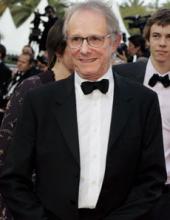Kenneth Loach (Ken Loach)
Kenneth Loach popularly known as Ken Loach is an acclaimed English film and television director born on the 17th June 1936 in Nuneaton, Warwickshire, England. Ken Loach is best known for his social realism and naturalistic style of direction, which includes portrayal of worker's rights, homelessness and other social issues in his movies.
Ken Loach’s father worked as an electrician in a nearby factory. Ken Loach started his educational career at King Edward VI Grammar School. After serving in the Royal Air Force for some time Ken resumed his education at St Peter's College, Oxford. Ken Loach performed in a comedy group while he was studying in Oxford; the then nascent group is now well established as Oxford Revue. In repertory theatre Ken Loach started his career as an actor but in the early 1960s changed course to direction with the television series Z-Cars. In 1966 Ken Loach started working on Cathy Come Home a documentary cum drama highlighting social problems like unemployment and homelessness giving critical insights into the modus operandi of the social services.
By the end of the 1960s Ken Loach started directing films. Kes made in 1969 is still regarded as Ken Loach’s best directed movie in Britain. It was based on the story of a boy and his kestrel. The story of the film was adapted from the Barry Hines novel A Kestrel for a Knave. During the 1970s and 80s Ken Loach directed movies which could not meet commercial expectations. However Ken Loach bounced back in the 1990s with a series of films achieving critical and commercial success. During his career Ken Loach claimed three Cannes Film Festival awards. In 2006 Ken Loach got the recognition of the Palme d’Or at the Cannes Film Festival, the highest honour at Cannes for his brilliant direction of The Wind That Shakes the Barley.
Ken Loach’s films are often liked by audiences due to their effective portrayal of realism rather than unadulterated acting. Ken often employs new actors who have had a real life experience of a particular situation to act in his movies compared to the industry trend of employing method actors. For the movie Bread and Roses, Ken Loach zeroed in on two actors who at one point in their lives had experienced living as a migrant and organizing a union. Pilar Padilla who performed the part of the lead female had to learn English language in order to play her part in the movie, giving a realistic look at the character she played. Ken Loach is a strong denouncer of censorship in cinema and was annoyed when Sweet Sixteen was given an 18 certificate from the censor board.
Ken Loach has been bestowed a degree of doctorate twice, in 2003 by the University of Birmingham and in 2005 from Oxford University. Ken Loach is also an honorary fellow of St. Peter’s College. In 2004 Ken Loach stood for election to the European Parliament on a Respect mandate as a member of the national council of the Respect Coalition.
Some of Ken Loach’s acclaimed works for television includes Z Cars (series, 1962) , Up the Junction (1965), Cathy Come Home (1966), Days of Hope (mini-series, 1975) , The Price of Coal (1977). Besides this Ken is also remembered for his outstanding direction of movies like Kes (1969), Bread and Roses (2000), The Navigators (2001) and The Wind That Shakes the Barley (2006).

